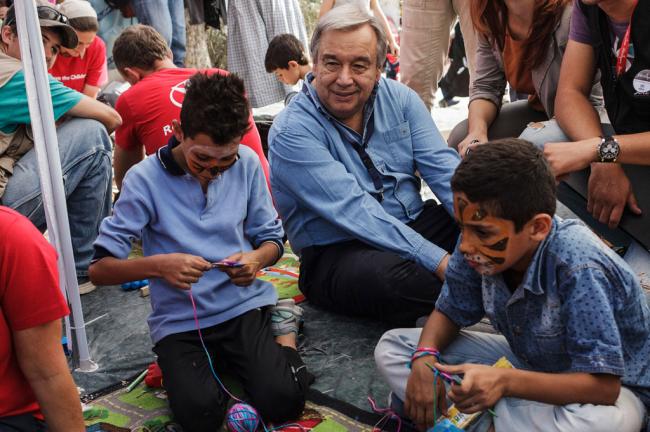
UN official thanks Greece and frontline islands for response to continued arrivals
“It is amazing that on a small island, you are managing, whereas in a big Europe, with half a billion people, they are finding it so difficult,” the UN High Commissioner for Refugees, António Guterres, told Lesbos Mayor Spyros Galinos and other Greek officials.
“We are always saying this crisis is manageable at the European level, but to be manageable, it needs to be much better managed.”
The chief of the UN High Commissioner for Refugees (UNHCR) was assessing conditions on the Greek island of Lesbos, the main landing spot for tens of thousands of people taking smuggler boats from the nearby Turkish coast. He said European governments had yet to match the “gigantic effort” that the island and its people had made in trying to cope with the huge influx.
Indeed, without a Europe-wide approach and an effective strategy in dealing with the influx, Guterres warned, criminal networks would continue to thrive.
He said, “When States are not able to organize the orderly movement of refugees, smugglers take charge, exploiting people further and adding to their suffering,” he stated.
Describing his island as “frontline,” Mayor Galinos said the main issue “is not the numbers, but the lack of a European policy to respond.” Nevertheless, he said, Greeks would continue to do whatever they could to address the crisis and combat smugglers, “who not only exploit the people, but who put their lives at continuous risk.”
“Above all, we are all human beings,” the Mayor added. “We must all recognize the position of these people because we might all find ourselves in this situation one day.”
UNHCR has deployed an emergency team to Greece and now has some 120 staff in the country to support the Government in its effort to address the continuing crisis.
The island of Lesbos, which according to the last census in 2011, had a population of 85,000 people, but is probably now several thousand higher, has received over 220,000 people in nine months.
UNHCR figures put the number of arrivals in September alone at 160,000, while the Greek coast guard records show 110,000 people.
According to the agency, the majority of the refugees and migrants arriving on Lesbos are from Syria, Afghanistan and Iraq. The rest, about five per cent, are migrants and refugees from 21 countries as varied as India, Bangladesh, Togo, Niger, Columbia, Haiti and the Dominican Republic.
The Greek Coast Guard on Lesbos reportedly receives between five to 10 distress calls a day, and then sets out to rescue people in overcrowded boats.
Meanwhile, Deputy Harbour Master, Antonio Sofiadellis, a leader in the Greek Coast Guard effort that has saved between 240-400 refugee and migrant lives every day, said that more people are being packed onto the flimsy boats these days – around 60 when 50 used to be the limit.
“The engines are very cheap and the smugglers don't care that they don't know how to operate the boats,” Sofiadellis explained.
He said, “This is something no country in Europe has faced. If we weren't there to rescue them, half or more than half would drown. The boats capsize, some fold, when the floor breaks.”
Guterres also visited the north of Lesbos, where most refugee boats land. The beaches were strewn with hundreds of bright orange life jackets and deflated rubber boats, soaked shoes and pieces of clothing.
Some 1,050 people had arrived overnight and volunteers helped them to an assembly point nearby, where they found food and a warm place to sleep in a large UNHCR shelter.
Some Syrian refugees he met told him they had fled directly from Aleppo, Damascus or Homs. Other Syrians said they could no longer make ends meet in neighbouring countries amid cuts in humanitarian aid and restrictions on work. Most people said they felt now was their chance to find safety in European countries where refugees were welcome.
Photo: UNHCR/A. Zavallis
Support Our Journalism
We cannot do without you.. your contribution supports unbiased journalism
IBNS is not driven by any ism- not wokeism, not racism, not skewed secularism, not hyper right-wing or left liberal ideals, nor by any hardline religious beliefs or hyper nationalism. We want to serve you good old objective news, as they are. We do not judge or preach. We let people decide for themselves. We only try to present factual and well-sourced news.







